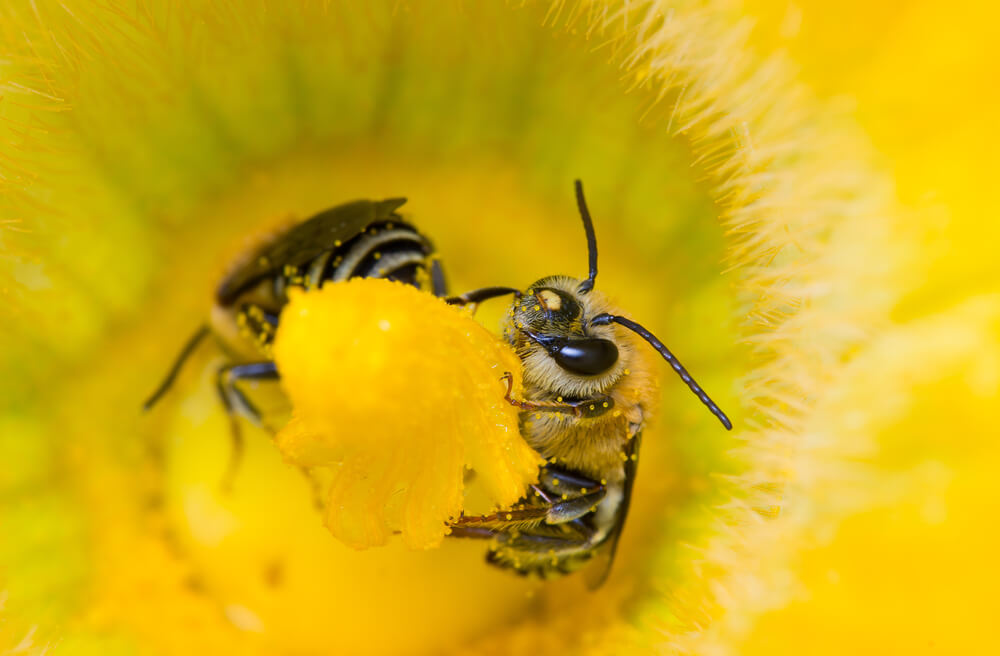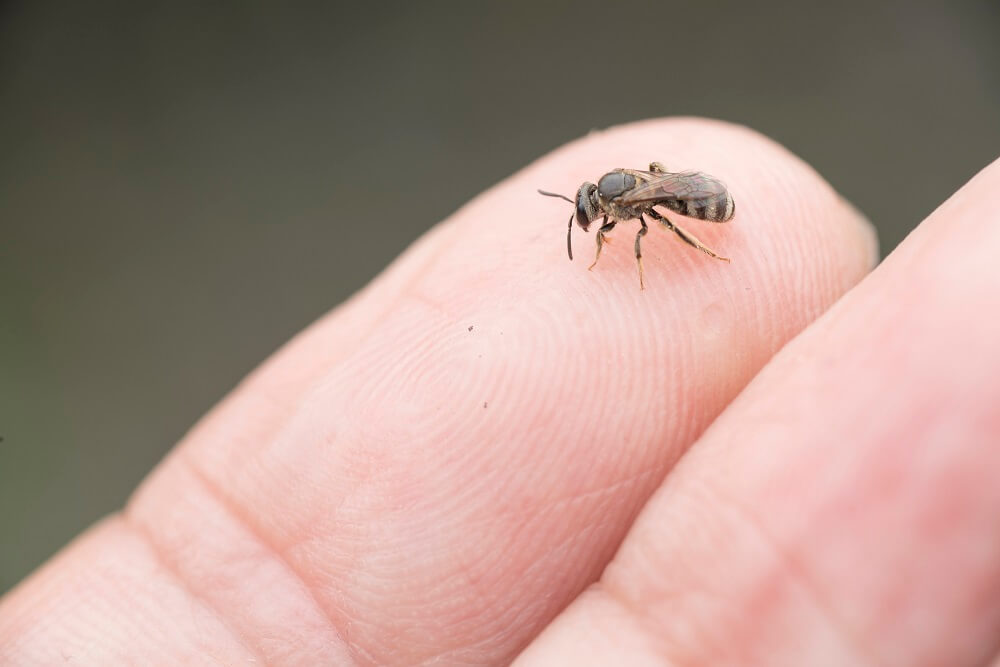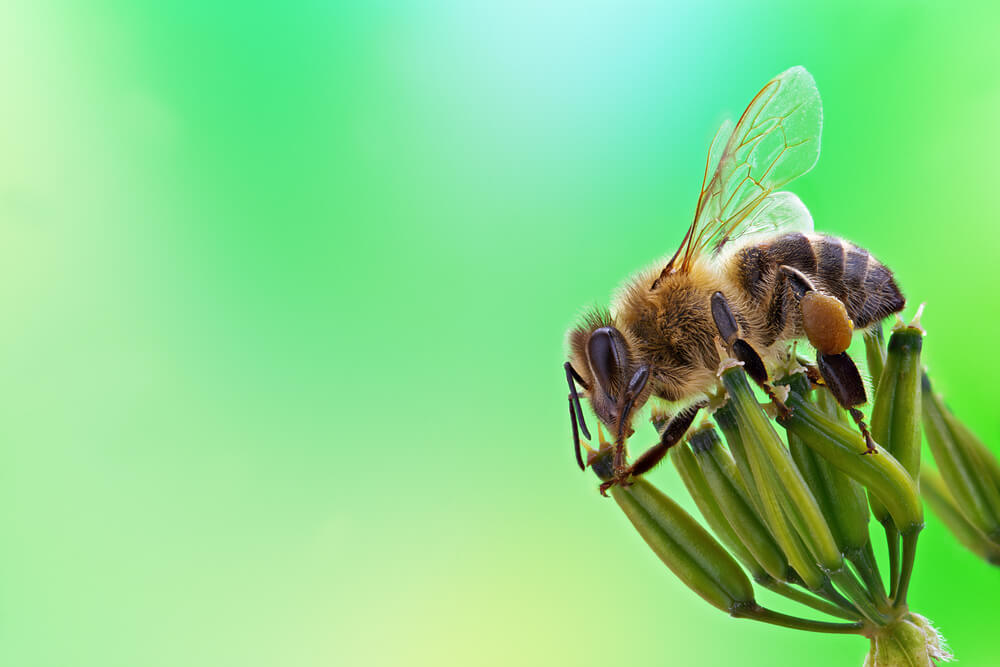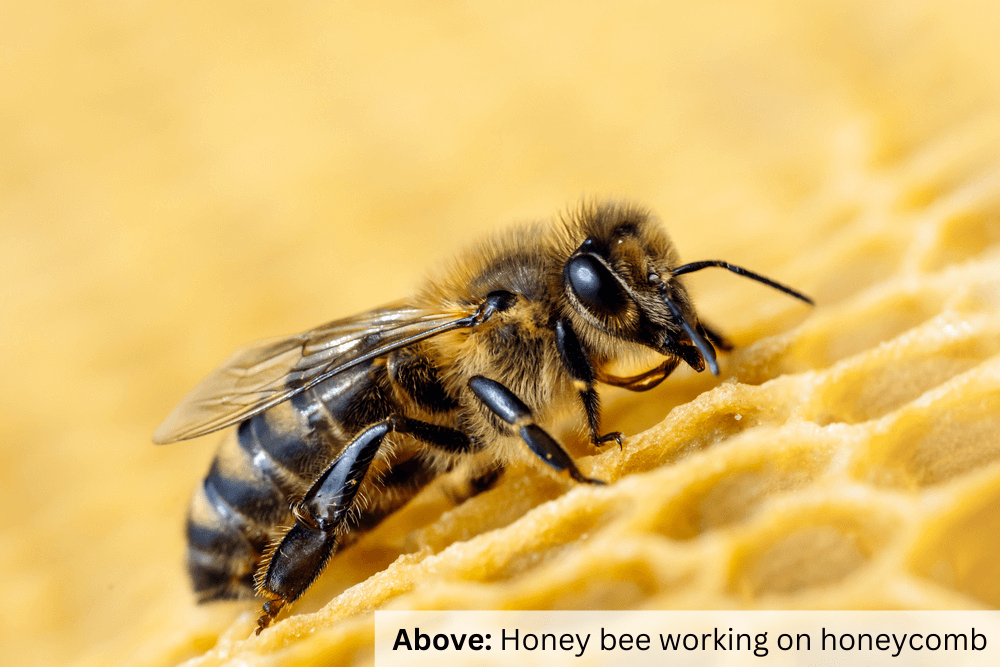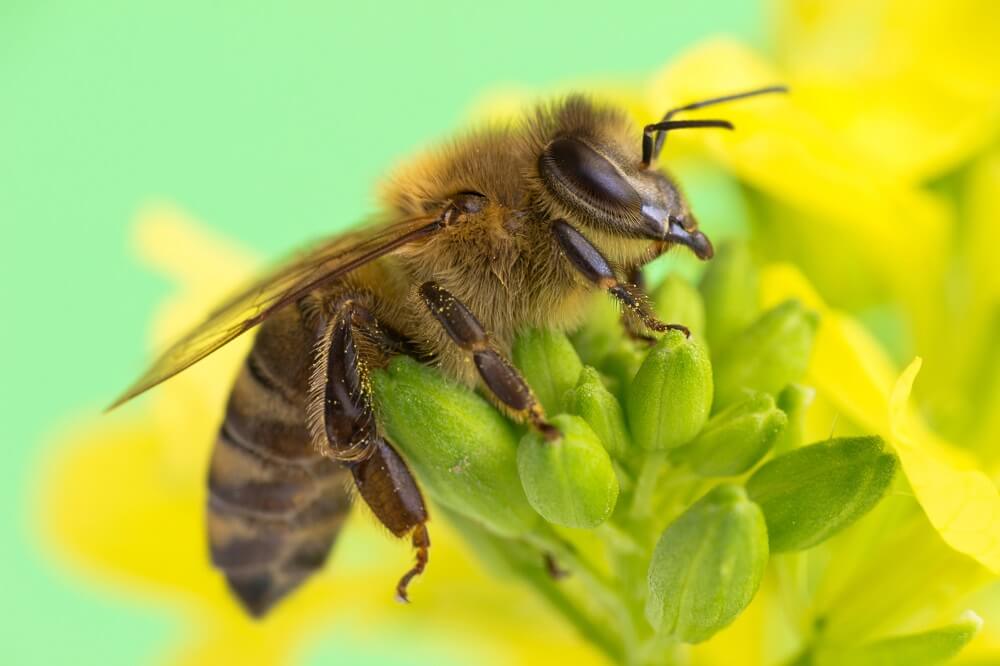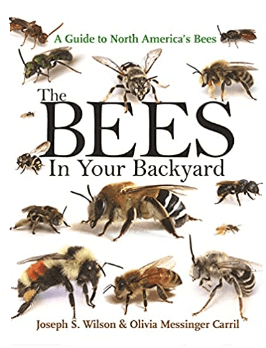Table of Contents:
What Are Squash Bees?
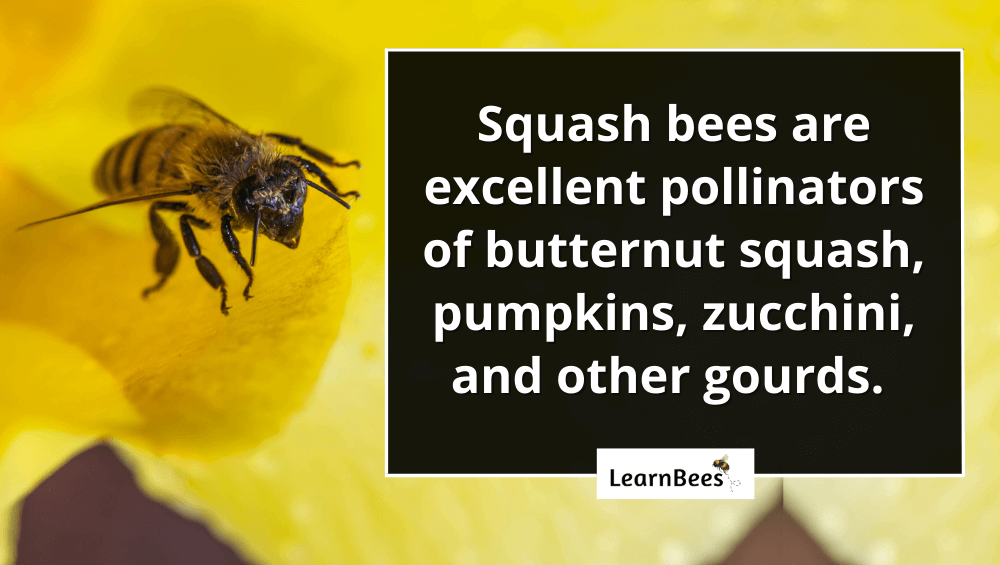
The term ‘squash bee’ is a nickname for bees belonging to the Peponapis pruinosa or Xenoglossa genus.
And as their name suggests?
Squash bees are excellent pollinators of butternut squash, pumpkins, and zucchini. They’re considered specialist bees because they’ve evolved to have a specific relationship with a few plant species.
Contrast that to generalist bees.
Generalist bees aren’t as picky about which flowers they pollinate. They frequently visit various flowers such as sunflowers, lilies, salvia, and lavender.
That said, squash bees occasionally collect pollen and nectar from other plants.
They’re commonly found in North America, Central America, and South America.
And here’s the thing:
These bees are solitary bees that live underground. Meaning, squash bees don’t live in hives like social bees. For nesting, they dig holes in the ground where they lay eggs.
More importantly?
Squash bees are wonderful additions to vegetable gardens. These bees typically nest right under the plants they pollinate. This includes nesting under squash, pumpkins, cucumbers, and zucchini.
Can Squash Bees Sting?
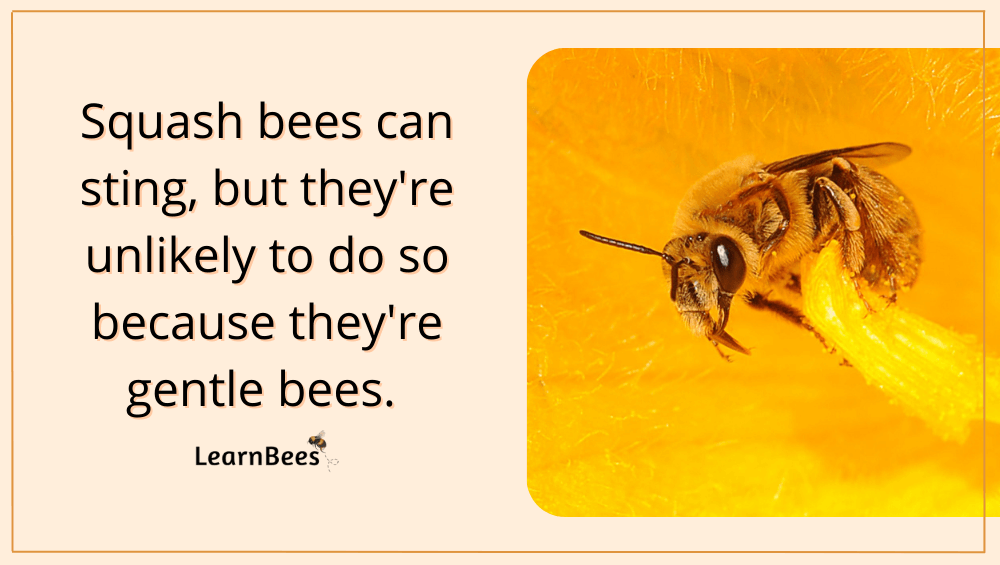
Squash bees have stingers, but they’re gentle bees that are unlikely to sting.
Keep in mind that squash bees are solitary bees who live alone. They don’t produce honey, nor do they live in colonies. As a result, they don’t have anything to be territorial over.
Compare that to honeybees.
Honeybees are social creatures that live in big colonies with thousands of other bees. A healthy honeybee colony can produce up to 100 pounds of honey each year. This makes honeybees a massive target for predators such as bears, skunks, honey badgers, and other insects.
It’s different for squash bees.
Sure, squash bees have predators to deal with too. But they don’t have the burden of protecting a colony or precious honey.
And because of this?
Squash bees are passive-natured and won’t go out of their way to sting you.
And here’s the thing:
Only female squash bees can sting. Male bees cannot. Stingers are modified egg-laying organs, so they’re only found in female bees.
This is true for all bee species, including honeybees, carpenter bees, and mason bees.
Are Squash Bees Beneficial?
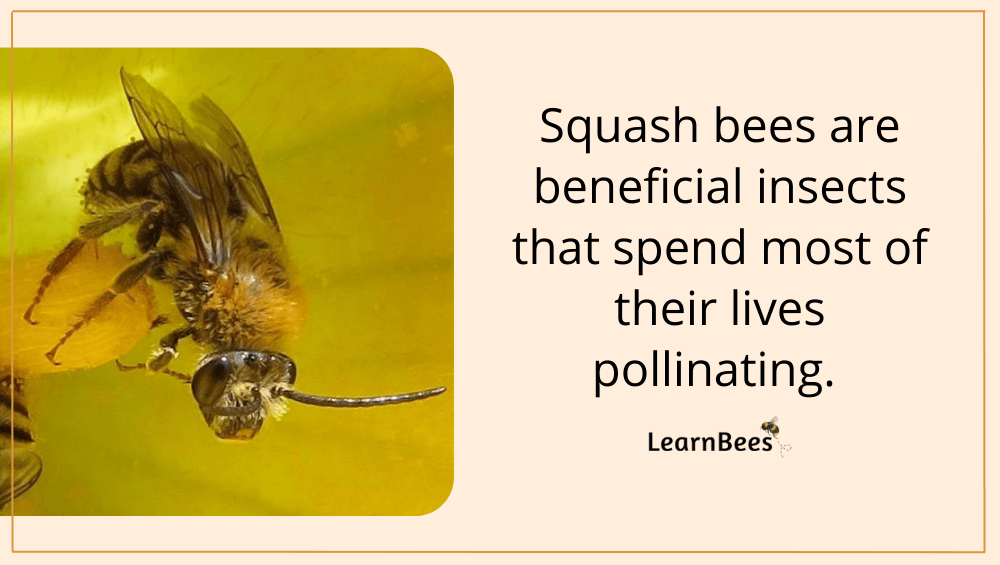
Yes, squash bees are beneficial.
For one, they’re essential pollinators who spend most of their lives gathering nectar and pollen from plants. When a squash bee lands on a flower, the hairs on its body collect pollen from the flowers.
Every time the bee flies from one plant to the next, it leaves a bit of pollen behind each time. Many plants need this type of pollen transfer to produce seeds. This process is known as cross-pollination.
Even better?
Both plants and bees benefit from pollination.
You see, a bee’s main diet consists of pollen and nectar from plants. Nectar is the bees’ major carbohydrate source, while pollen is their primary protein source.
Flowers offer nectar as a way to attract bees to pollinate them. This allows the plants to be cross-pollinated, allowing them to create seeds.
FAQs on Squash Bees
- What do squash bees look like?
- What is the scientific name for squash bee?
- How do you attract squash bees?
- How far do squash bees travel?
- Are squash bees native?
- Do squash bees pollinate cucumbers?
- Where do squash bees live?
- What do squash bees eat?
- Are squash bees rare?
- How do I get rid of squash bees?
- Do squash bees produce honey?
- Are squash bees aggressive?
- Are squash bees solitary or social?
- Where do squash bees go in the winter?
- Are squash bees actually wasps?
- Are squash bees actually hornets?
- Are squash bees dangerous?
- Can squash bees sting multiple times?
What do squash bees look like?
There are many different species of squash bees. They look similar to honeybees, with black stripes on their abdomen. However, they are usually a little bit smaller than honeybees.
—> Go back to the FAQs on squash bees
More to Explore:
What is the scientific name for squash bee?
“Squash bee” is a nickname for bees that belong to the genus Xenoglossa or Peponapis pruinosa.
—> Go back to the FAQs on squash bees
More to Explore:
How do you attract squash bees?
If you want to attract squash bees, you can try planting squash, zucchinis, pumpkins, gourds, and cucumbers. These are the plants that they typically pollinate.
—> Go back to the FAQs on squash bees
More to Explore:
- Do Carpenter Bees Pollinate?
- How Long Do Bumble Bees Live?
- Honeybees vs. Bumblebees: How Do They Compare?
How far do squash bees travel?
Squash bees tend to nest close to the plants they pollinate. That said, many types of bees will fly up to a few miles away from their nests in search of food. So it wouldn’t be uncommon for squash bees to travel to find pollen and nectar.
For example, honeybees have an average travel distance of one to two miles, but they can go much farther if needed.
—> Go back to the FAQs on squash bees
More to Explore:
Are squash bees native?
Squash bees are native to North America, Central America, and South America.
—> Go back to the FAQs on squash bees
More to Explore:
- Ground Bees: Are They a Threat to Your Yard?
- Wasps vs. Honeybees: Are They Different?
- Do Bumble Bees Bite?
Do squash bees pollinate cucumbers?
Yes, squash bees prefer the gourd family, which includes cucumbers, pumpkins, watermelons, and squash. They are one of the main pollinators for these types of plants.
The flowers of a cucumber plant are small and yellow, with five folded petals per blossom. They can be found on the cucumber plant’s vines. The flowers grow under the vast, green foliage of the cucumber plant, which helps aid in shade and protection from the elements.
—> Go back to the FAQs on squash bees
More to Explore:
Where do squash bees live?
“Where do squash bees nest?” is a common question we get.
Squash bees nest underground and are native to North America, Central America, and South America.
These bees are solitary creatures, meaning they live alone and do not live in colonies like social bees. Squash bees make their nests in the ground.
Unlike solitary bees, social bees live in large colonies with many other bees. The most popular social bee is the honeybee. Honeybees live in hives with a queen bee, worker bees, and drones.
Honeybee hives are large, with tens of thousands of bees in them.
—> Go back to the FAQs on squash bees
More to Explore:
What do squash bees eat?
Squash bees primarily feed on pollen and nectar from squash, pumpkin, or other plants belonging to the gourd family.
And here’s the thing:
Bees are vegetarian. All of their food comes from plants. Nectar is their main source of carbohydrates and pollen is their main source of protein.
Compare that to wasps or hornets, which will feed on other insects as a source of protein. It’s the female wasps that go out hunting for insects. They paralyze their prey with a powerful sting. Then they bring the insect back to the nest for everyone to feed on.
—> Go back to the FAQs on squash bees
More to Explore:
Are squash bees rare?
While squash bees aren’t as common as the European honeybee, they aren’t considered rare. There are more than ten species in the genus Xenoglossa and Peponapis pruinosa, which are the species of bees known as squash bees.
—> Go back to the FAQs on squash bees
More to Explore:
How do I get rid of squash bees?
You should not try to get rid of squash bees because they’re beneficial pollinators that aren’t aggressive. They won’t go out of their way to sting people or pets. These bees are solitary, so they don’t have a hive or honey to protect.
The best thing you can do is to ensure they have a steady food source by planting flowers and vegetables they like to pollinate, such as squash, pumpkins, and cucumbers.
—> Go back to the FAQs on squash bees
More to Explore:
Do squash bees produce honey?
No, squash bees don’t produce honey.
The main species of bee that produces honey are honeybees. Honeybees are social bees that live in hives with a queen bee, worker bees, and drones.
Honeybees collect nectar from flowers and store it in their honey crop, which is an internal organ used for storage. Once they’re back at the hive, they regurgitate the nectar into the mouths of the worker bees.
The worker bees then fan their wings over the nectar to help evaporate the water out of it. This process turns the nectar into honey. Once the honey has the right consistency, the bees seal it in a wax comb inside the hive.
Honeybees use honey as a food source, which is why they make so much of it. They will store honey in the comb and eat it when flowers aren’t blooming, and there isn’t any nectar available.
Squash bees don’t produce honey because they’re solitary creatures that live alone, not in hives. To make honey, bees need the help of many bees to get the job done.
—> Go back to the FAQs on squash bees
More to Explore:
Are squash bees aggressive?
No, squash bees are not aggressive. These bees are solitary, so they don’t have a hive or honey to protect. In other words, they’re not territorial.
For example, honeybees are more likely to be territorial because they’re protecting their queen, baby bees, and honey. If you get too close to a honeybee hive, the bees might think you’re threatening their hive, which could result in you getting stung.
But since squash bees are solitary, they don’t have anything to protect, so they’re not aggressive.
—> Go back to the FAQs on squash bees
More to Explore:
Are squash bees solitary or social?
Squash bees are solitary bees that don’t live in colonies.
Instead, the female squash bee independently builds her own nest in the ground.
During the warmer months, you might see several squash bees flying around your garden. However, they’re not working together in a hive. Instead, each squash bee is busy collecting food for her own nest.
You’re more likely to notice squash bees during the daytime because they’re actively pollinating squash, pumpkins, or other plants that belong to the gourd group. They return to their nests at night to sleep.
—> Go back to the FAQs on squash bees
More to Explore:
- What Are Blue Orchard Bees?
- The Fascinating Life of Queen Bees
- Queen Bee Versus Worker Bees – How Do They Compare?
Where do squash bees go in the winter?
Squash bees overwinter as larvae or pupae in the nest that the adult squash bee made for them. As the temperature rises in the spring, they will emerge as adult bees.
Bees are cold-blooded creatures, so they don’t thrive in cold weather. This explains why they aren’t active in the winter months.
—> Go back to the FAQs on squash bees
More to Explore:
Are squash bees actually wasps?
No, squash bees are not wasps. Wasps are an entirely different species of insect.
For example, squash bees only eat pollen and nectar from flowers. On the other hand, wasps are predators that eat nectar and other insects, such as caterpillars or even bees.
—> Go back to the FAQs on squash bees
More to Explore:
Are squash bees actually hornets?
No, hornets and squash bees are two separate species.
Squash bees belong to the genus Xenoglossa or Peponapis pruinosa.
But hornets are a subspecies of wasps. All hornets are wasps, but not all wasps are hornets.
Bees, however, are a different species altogether.
At first look, some hornets might be mistaken for a bee. But typically, hornets are bigger and less fuzzy than squash bees.
—> Go back to the FAQs on squash bees
More to Explore:
Are squash bees dangerous?
No, squash bees are not dangerous to humans or pets. These bees are not aggressive, and they’re unlikely to sting. They’re not territorial because they don’t have a colony or honey to protect.
Bees that live in colonies or produce honey are more likely to be defensive because they’re vulnerable to many predators. For instance, honey badgers, bears, skunks, and other predators are likely to attack honeybee hives.
In fact, squash bees are actually beneficial to humans because they help pollinate squash and other plants in the gourd family. That’s why many gardeners try to attract squash bees and other pollinators to their garden.
So if you see a squash bee in your garden, there’s no need to be afraid. Just leave it alone and let it do its job.
—> Go back to the FAQs on squash bees
More to Explore:
Can squash bees sting multiple times?
Yes, female squash bees can sting multiple times because they have smooth stingers that don’t get lodged in the skin.
But remember:
Male bees can’t sting because they don’t have stingers. This is true for all bee species, including sweat bees, carpenter bees, and honeybees.
But the good news?
Squash bees are gentle-natured bees that don’t sting for no reason. They’d only sting if they felt seriously threatened, such as if you were poking your fingers into their nest or trying to grab them.
In most cases, you’ll be fine as long as you remain a passive observer of the bee and don’t try to invade its personal space.
